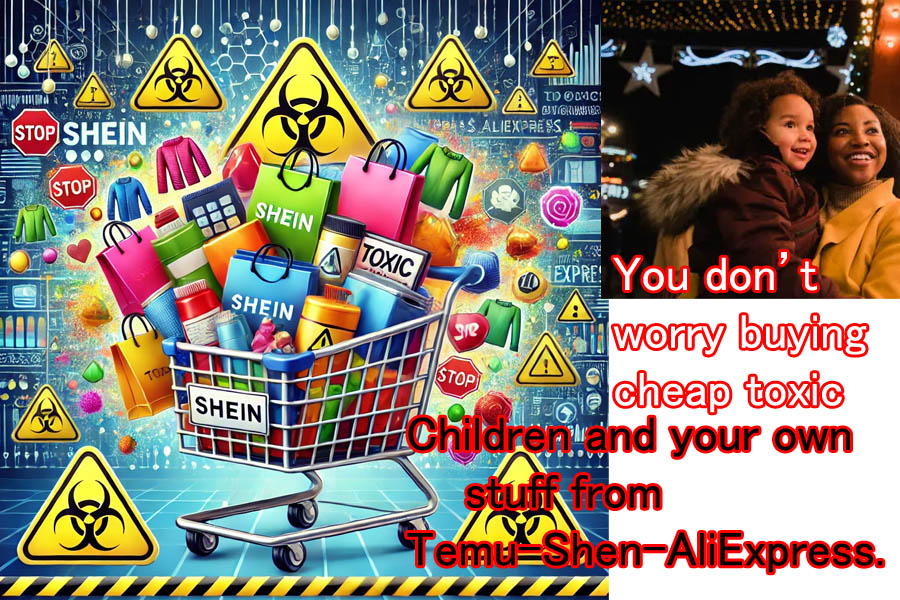
In recent years, platforms like Shein, Temu, and AliExpress have soared in popularity due to their affordability, extensive product range, and lightning-fast shipping. These Chinese e-commerce giants have captivated global markets, offering consumers the allure of ultra-cheap goods at the click of a button. However, a growing wave of scrutiny has hit these platforms as concerns about product safety and unfair trade practices have come to light. Governments across the world, including the U.S. and South Korea, are stepping in to address these issues, with the latest crackdowns threatening to reshape the very business models that have propelled these platforms to success.
On Friday, September 13th, 2024, the Biden administration announced a set of stringent measures targeting the de minimis loophole, which has long allowed these platforms to ship low-value goods—under $800—into the U.S. duty-free. This policy, originally designed to simplify imports for small-scale purchases, has been exploited by companies like Shein and Temu, leading to a flood of products entering the U.S. market without proper oversight. As a result, not only are U.S. retailers losing out on fair competition, but consumer safety is being compromised, with numerous reports of hazardous and counterfeit goods making their way into households.
The Global E-Commerce Surge: Risk and Reward
Platforms like Shein, Temu, and AliExpress have played a significant role in the global rise of e-commerce, particularly in markets like South Korea, where the popularity of Chinese goods is surging. According to the Federation of Korean Industries, South Korean consumers spent an astounding $2.5 billion on Chinese e-commerce platforms in 2023, marking a clear shift away from Western platforms like Amazon and eBay.
But while consumers enjoy the low costs and wide selection, there is a darker side. Reports from South Korea have highlighted a troubling trend: unsafe products, particularly from Chinese platforms, have been flagged for failing safety tests. Items ranging from children's toys to everyday electronics have been found to contain dangerous chemicals, including phthalates—a group of chemicals linked to developmental issues in children.
The Seoul Metropolitan Government has ramped up testing efforts to protect consumers, leading to the removal of numerous unsafe products from online shelves. However, with millions of items being imported daily, a small fraction can be tested, leaving many hazardous products unchecked.
U.S. Crackdown: Closing the Loophole
In the U.S., the situation is equally concerning. Under the previous rules, goods valued under $800 could enter the country without paying duties or facing thorough inspection, thanks to the de minimis exemption. Companies like Shein and Temu have used this loophole to send billions of dollars' worth of products into the U.S. without the tariffs that larger imports face. The sheer volume of low-value package imports has skyrocketed from 140 million to over a billion annually over the past decade, with a large portion originating from Chinese e-commerce platforms.
This flood of goods has led to significant issues, ranging from product safety violations to the entry of counterfeit and illegal products, including items laced with fentanyl. The Biden administration’s response has been to implement stricter regulations, requiring more detailed reporting from importers and closing the de minimis loophole. These changes aim to create a level playing field for U.S. businesses, protect consumers, and prevent dangerous products from entering the market unchecked.
The International Trade Dilemma: Growth at a Cost
China’s government has actively supported its e-commerce giants, granting them tax breaks, subsidies, and regulatory leniency that have allowed companies like Shein, Temu, and AliExpress to dominate global markets. Since 2015, China has established 165 cross-border e-commerce pilot zones, allowing exports to enjoy relaxed taxes and other financial incentives.
While these policies have fueled the explosive growth of Chinese e-commerce platforms, they have also contributed to the erosion of domestic industries in countries like the United States. Thousands of textile factories have shut down, leaving American workers displaced, as Chinese-made goods flood the market at prices local manufacturers can’t match.
Closing the de minimis loophole is seen as a critical move to prevent further damage to U.S. industries. By imposing stricter tariffs and regulations, the U.S. government hopes to reduce the influx of low-cost goods and restore balance to the marketplace.
Mounting Safety Concerns Across Borders
As e-commerce platforms have become more prominent, concerns about product safety have intensified. In South Korea, the government has teamed up with testing labs to examine a variety of items from Temu, AliExpress, and other Chinese platforms. These tests have yielded alarming results: children’s products such as toys and clothing have been found to contain phthalates at levels 680 times higher than allowed. The risks are clear—exposure to such substances can cause long-term developmental issues and harm to children’s health.
In response to these findings, governments worldwide are focusing on raising consumer awareness. South Korea has launched public campaigns, urging consumers to prioritize safety over price and educating them about the potential dangers of buying from unregulated e-commerce platforms.
What’s Next for Global E-Commerce?
The regulatory crackdown in the U.S. and South Korea signals a pivotal moment for global e-commerce platforms. As governments take action to safeguard consumers and ensure fair competition, platforms like Shein, Temu, and AliExpress will need to adapt to survive. Shein and Temu's business models, which rely heavily on low-cost goods and rapid shipping, could face serious challenges. New regulations may drive up prices and slow down delivery times, potentially alienating their customer base.
For consumers, the lure of cheap, fast purchases may no longer be worth the risks associated with unsafe products and counterfeit goods. Increasingly, shoppers will have to weigh the benefits of convenience against potential health risks and the broader economic consequences.
A Shift in the Global Marketplace
The rise of platforms like Shein, Temu, and AliExpress has revolutionized global commerce, but as scrutiny intensifies, these giants face their toughest challenge yet. Governments are stepping in to close loopholes, raise safety standards, and protect local industries. For the e-commerce giants, the future lies in their ability to adapt to a more regulated marketplace.
A new chapter in global commerce is unfolding—one where quality, accountability, and safety will likely take precedence over sheer volume and speed. The coming years will determine whether platforms like Shein and Temu can evolve and thrive in this shifting landscape or whether more sustainable e-commerce models will rise to take their place.
#ToxicProducts 🧪 #SheinSafety ⚠️ #TemuConcerns 📦 #AliExpressRisks 🚨 #ConsumerProtection 🛡️ #USRegulations 🇺🇸 #EcommerceSafety 🛒 #HazardousGoods 🚫 #GlobalTrade 🌍 #UnsafeImports ❌
Thank you for reading: globalpostheadline.com





